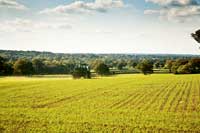Slow blackgrass growth delays Atlantis timing

Early indications suggest that, despite a new recommendation for earlier Atlantis applications, delayed crop and blackgrass growth might prevent growers taking advantage this autumn.
Timing trials continue to show Atlantis (mesosulfuron + iodosulfuron) applications in the autumn are generally most effective, says Gordon Anderson-Taylor of Bayer CropScience.
More recent trials, combined with an ADAS finding that most blackgrass appears to emerge in the autumn, has encouraged the firm to recommend Atlantis can be applied from when the blackgrass reaches the one-leaf stage. Previously it has suggested the optimum timing was two- to three-leaves.
But while agronomists say in an ideal world they would make recommendations for Atlantis this autumn, conditions are already making it unlikely that crops will be at the right growth stage to do so.
“In central and south Essex we’re only just starting to get crop emergence in a big way,” Graham Brooks of Prime Agriculture says. “Emergence is generally uneven in fields and taken a lot longer than expected.
“So, whether it is through seed dormancy or delayed and protracted emergence, blackgrass is going to struggle to get to the one to two-leaf stage by the first week of November. That’s about the last week when you can guarantee you’re going to get good growing conditions.”
Generally little blackgrass is emerging currently, he adds. “The pressure isn’t high. We did push on with pre-emergence sprays, despite the dry, so we’ve seen the benefit.”
So far he has left only half a dozen recommendations for Atlantis on farm, he says. “Every year you want to do more, but it is not shaping up to be a great year for Atlantis.”
Farmacy agronomist Mark Bellamy agrees in an ideal world he would like to apply Atlantis in mid November to actively growing blackgrass. “But what worries me this year is the patchy emergence of crops and blackgrass, particularly from cloddy seed-beds.
“It is making it difficult to see how much will be applied before Christmas – I doubt it will be more than 30%. My plan is to get as much on as possible if field conditions allow, but in the south / mid-Lincolnshire area there aren’t many green crops of wheat.”
The key is to inspect fields closely, Dr Anderson-Taylor says. “We changed the window to one-leaf to encourage growers to get out there and have a look at what they’ve got. That’s particularly important if you haven’t put a pre-emergence spray on.
“See if the blackgrass is there, and don’t wait for every last large flush. Ignore the dormancy issue, it simply slows blackgrass emergence and lowers numbers, much like a late-drilled crop. What will come up, will come up in November and December, subject to moisture.”
In most years, spring flushes of blackgrass are relatively insignificant compared with the autumn emergence, Stephen Moss of Rothamsted Research says. “All the work we’ve done has never shown there is a significant flush of blackgrass or ryegrass in well-established winter cereals.
“In a trial last year around 90% emerged by the end of November, and the blackgrass that did emerge in the spring produced far fewer heads, so the idea it is important because of seed production doesn’t really hold water.
“It means the priority should be to control those that emerge in the autumn. But you have to be aware of different autumns and clearly dry seed-beds are delaying emergence this autumn. My expectation is that once we have moisture most will come up in late autumn, but may well continue to come up in the winter, particularly if it is mild.
“So clearly in a year like this, it probably isn’t a good idea to have tunnel vision about spraying in the first week of November come what may, and will be important to inspect fields very closely.”
Advice
Further advice on blackgrass control can be found in these three videos produced by Bayer CropScience and featuring well-known independent experts, including Rothamsted Research’s Stephen Moss, The Arable Group’s Jim Orson, Lincolnshire agronomist Sean Sparling and ADAS’s Sarah Cook.
Topics tackled in two videos include how to get the best out of Atlantis, including practical application advice, and tackling tough blackgrass, as well updating the latest resistance picture.
Protecting against blackgrass resistance
Planning a blackgrass control programme
A third video, featuring Farmers Weekly Arable Adviser of the Year, Peter Riley from Prime Agriculture, Douggie Bain from Masstock and Bayer’s Tim Holt discusses how to control meadowgrass without IPU.

